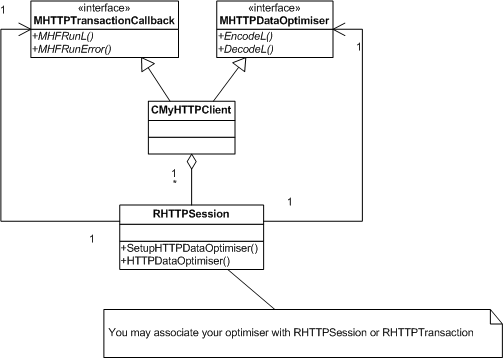HTTP Whole Message Filter Example
The following diagram illustrates the class relationship between the MHTTPDataOptimiser interface and the RHTTPSession class:
For more information about MHTTPTransactionCallback , see A simple HTTP Client session .
The following code segment illustrates how to define the header file required for implementing the HTTP Whole Message Filter APIs:
#include <http.h>
class CMyHTTPClient: public CBase,
public MHTTPTransactionCallback,
public MHttpDataOptimiser
{
public: // methods from MHTTPTransactionCallback
virtual void MHFRunL(RHTTPTransaction aTransaction, const THTTPEvent& aEvent);
virtual TInt MHFRunError(TInt aError, RHTTPTransaction aTransaction, const THTTPEvent& aEvent);
public: // methods from MHttpDataOptimiser
virtual void EncodeL (const TDesC8& aHttpData, HBufC8*& aEncodedData);
virtual void DecodeL (const TDesC8& aData, HBufC8*& aHttpData, TBool& aTransFail);
};
The following code segment illustrates how HTTP Whole Message Filter APIs can be used to enable support for Web Acceleration:
#include "CMyHTTPClient.h"
// CMyHTTPClient.cpp
//
// defines CMyHTTPClient class: CMyHTTPClient
// Literals used in the file
_LIT8(KHttpAuthenticationUrl, "http://remix.kwed.org");
void CMyHTTPClient::CreateTransactionL()
{
TUriParser8 up;
up.Parse(KHttpAuthenticationUrl);
RHTTPSession session;
RHTTPTransaction trans;
// Open the HTTP session
session.OpenL();
CleanupClosePushL(session);
RStringPool strP = session.StringPool();
//To enable MHTTPDataOptimiser for transaction
// Open a GET transaction, specifying this object as the request body data supplier
trans = session.OpenTransactionL(up, *this, strP.StringF(HTTP::EGET,RHTTPSession::GetTable()));
CleanupClosePushL(trans);
trans.SetupHttpDataOptimiser(*this);
trans.SubmitL();
CleanupStack::PopAndDestroy(&trans);
CActiveScheduler::Start();
CleanupStack::PopAndDestroy(&session); //Closes the session
}
TInt CMyHTTPClient::MHFRunError(TInt aError, RHTTPTransaction aTransaction, const THTTPEvent& aEvent)
{
// Handle Error appropriately
}
void CMyHTTPClient::MHFRunL(RHTTPTransaction aTransaction, const THTTPEvent& aEvent)
{
// Handle events from the framework.
switch (aEvent.iStatus)
{
case KErrHttpOptimiserFailsTrans:
{
INFO_PRINTF1(_L("Cancelling/Failing Transaction\n"));
aTransaction.Fail(THTTPFilterHandle::EProtocolHandler);
} break;
}
return;
//The following statement is used to eliminate leavescan errors
User::Leave(KErrGeneral);
}
void CMyHTTPClient::EncodeL (const TDesC8& aHttpData, HBufC8* &aEncodedData)
{
//Provide your own custom encoding implementation
}
void CMyHTTPClient::DecodeL (const TDesC8& aData, HBufC8*& aHttpData, TBool& aTransFail)
{
//Provide your own custom decoding implementation
}
This code enables the MHTTPDataOptimiser for a transaction by using RHTTPTransaction::SetupHTTPDataOptimiser() and also illustrates where custom encoding and decoding mechanisms are implemented.
Note: Alternatively, in this code, you can use the following code segment to enable MHTTPDataOptimiser for a particular session.
session.SetupHttpDataOptimiser(*this);
Copyright ©2010 Nokia Corporation and/or its subsidiary(-ies).
All rights
reserved. Unless otherwise stated, these materials are provided under the terms of the Eclipse Public License
v1.0.
